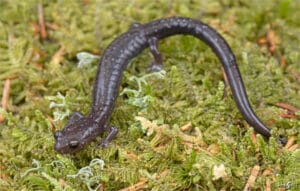NHSM Herp Club Member: $0
Education for All: $0
Donation – Suggested: $5
The March meeting of the Herp Club takes us hundreds of miles away into Appalachia.
The Appalachian Mountains are classified as a global biodiversity hotspot and often referred to as the salamander capital of the world, with about 14% of the world’s salamander species occurring in this region. In the last few decades, amphibian declines and extinctions have been documented at an alarming rate, and in the Appalachians, there is a concern for loss of amphibian biodiversity and possible extinction of endemic species. Amphibians in the Appalachian Mountains face a wide array of threats, and in West Virginia climate change and habitat fragmentation pose the greatest risks to the state’s biodiversity. Join Lacy Rucker as she talks about salamander diversity within this region, the contemporary threats to woodland salamander species, and her research that is focused on the mitigation of these threats in the Monongahela National Forest.
PRESENTER BIO:
Lacy Rucker is a Ph.D. candidate at West Virginia University. Rucker has become well acquainted with the high Allegheny Mountains of the Monongahela National Forest, where for the past 5 years, she has worked with state and federal agencies to assess salamander populations, assess mitigation efforts, and determine best practices for the conservation of imperiled species.
She received her B.Sc. in Wildlife and Fisheries Science with a minor in Forestry from the University of Tennessee-Knoxville in 2012. After graduating from UTK, Rucker worked at the Center for Forest Ecosystem Assessment at Alabama A&M University where she focused on the effects of timber removal on amphibian and reptile abundance in upland hardwood forests on the Cumberland Plateau. Her Ph.D. research focuses on the impacts of climate change and habitat fragmentation on woodland salamander species, including the federally threatened Cheat Mountain salamander.

